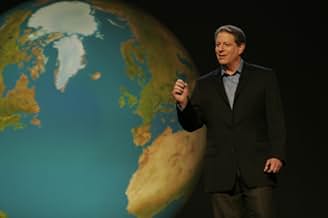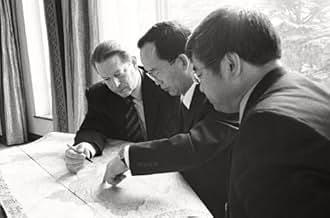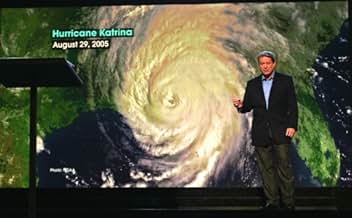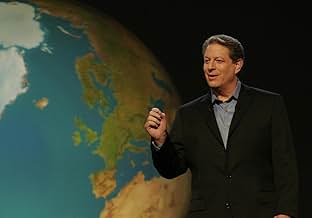VALUTAZIONE IMDb
7,4/10
86.245
LA TUA VALUTAZIONE
Davis Guggenheim segue Al Gore nelle sue conferenze mentre l'ex candidato alla presidenza fa campagne per aumentare la consapevolezza sui pericoli del riscaldamento globale e chiede un'azion... Leggi tuttoDavis Guggenheim segue Al Gore nelle sue conferenze mentre l'ex candidato alla presidenza fa campagne per aumentare la consapevolezza sui pericoli del riscaldamento globale e chiede un'azione per frenarne gli effetti sull'ambiente.Davis Guggenheim segue Al Gore nelle sue conferenze mentre l'ex candidato alla presidenza fa campagne per aumentare la consapevolezza sui pericoli del riscaldamento globale e chiede un'azione per frenarne gli effetti sull'ambiente.
- Regia
- Sceneggiatura
- Star
- Vincitore di 2 Oscar
- 34 vittorie e 11 candidature totali
George Bush
- Self
- (filmato d'archivio)
- (non citato nei titoli originali)
George W. Bush
- Self
- (filmato d'archivio)
- (non citato nei titoli originali)
Ronald Reagan
- Self
- (filmato d'archivio)
- (non citato nei titoli originali)
Recensioni in evidenza
When this movie came out I purposely avoided it. The trailers for it seemed over the top with a doomsday sort of approach. It became a political football immediately and the extreme views of both supporters and detractors turned me off from seeing it as well. After 13 years I finally watched it out of idle curiosity rather than any strong interest in the pros or cons of any climate change debate. And maybe that's what it takes to view certain documentaries with any sort of objectivity. I always thought Gore was a bit of an alarmist on the topic when seeing him interviewed after the movie came out. However the ultimate irony is that the movie (and Gore) probably understated the peril of climate change at the time. After 13 years the predictions now seem a bit tame, if anything, especially when compared to the actually tally of extreme weather events that have affected just the US. And the actual rate of glacial melting, polar ice retreat and permafrost degradation is actually a bit faster than predicted even at the time the movie was made. I notice many negative reviews concentrate on the possible misinterpretation of certain data or the omission of conflicting sources and possible counter narratives using the same data. All well and good. The only problem with those criticisms now is that they have been overtaken by events in the space of just 13 years. Both Gore and his critics got it wrong. Climate change is worse than Gore or the even more extreme partisans predicted. Not a pleasant realization to come to.
In the early 90's the CIA changed its charter from monitoring the Soviets to looking at all serious threats to the nation. Out of this came Project Medea, focused on climate change. Using classified intelligence much of it still classified this large project concluded absolutely that global warming was occurring and that it was an immanent threat to the nation. This was reported in public by the Director in 1996.
When Bush came to power, the project was dismantled by Cheney who as Secretary of Defense fought the establishment of Medea. The results were buried and denied and Bush went on record saying that climate change was a hoax. (Both he and McCain now admit that climate change is occurring but that we need to "be deliberate" and "cost effective" in responding. You know what that means.)
Some of the material from Medea is used in this movie: the Arctic Ice Cap thickness survey, but if Gore (who was briefed at the time) could have used that larger material, his case would have been even stronger. It is strong enough, despite a few unnecessarily dramatic photographic effects that bend the context here and there. That classified science might not have made for a cinematic presentation because much of it deals with extinction-scale pandemics.
The presentation program used here is KeyNote, Apple's competitor to Microsoft's PowerPoint. Its worth noting that it is a very snazzy product. Apparently much of the design from that period came from the wishes of Gore for this project and the demands of Steve Jobs for his own keynote speeches. Its a great story by itself.
In terms of narrative construction, there are two stories here. One is the story of the collapse of the Earth's weather system. Frankly, I think he could have done a better job on this. The science is complex but overwhelming. But it does not lend itself well to pictures or simple predictions.
To make this palatable, you need a wrapper story, a framing narrative. What's refreshing about this is that the usual choice wasn't made: to focus on the "conspiracy" of climate change deniers, a couple of outlier scientists and a passel of industry groups and ideologue political organizations. Instead, they chose to wrap the slideshow with a story of redemptive idealism about the presenter. I think it works, but it carries baggage.
About two fifths of the electorate voted against this guy, and many of those did because they preferred a different myth, a different story. That's a pretty heavy burden to overcome if what you want to do is lubricate the essential message. I had only a little trouble with it because I know how truly earnest he is. But earnestness and dedication isn't science, and facts, truth is supposed to be the issue at core.
You cannot be successful in advertising that with personal voyages and memories.
But so far as the slide show. Its definitely worth watching.
Ted's Evaluation -- 3 of 3: Worth watching.
When Bush came to power, the project was dismantled by Cheney who as Secretary of Defense fought the establishment of Medea. The results were buried and denied and Bush went on record saying that climate change was a hoax. (Both he and McCain now admit that climate change is occurring but that we need to "be deliberate" and "cost effective" in responding. You know what that means.)
Some of the material from Medea is used in this movie: the Arctic Ice Cap thickness survey, but if Gore (who was briefed at the time) could have used that larger material, his case would have been even stronger. It is strong enough, despite a few unnecessarily dramatic photographic effects that bend the context here and there. That classified science might not have made for a cinematic presentation because much of it deals with extinction-scale pandemics.
The presentation program used here is KeyNote, Apple's competitor to Microsoft's PowerPoint. Its worth noting that it is a very snazzy product. Apparently much of the design from that period came from the wishes of Gore for this project and the demands of Steve Jobs for his own keynote speeches. Its a great story by itself.
In terms of narrative construction, there are two stories here. One is the story of the collapse of the Earth's weather system. Frankly, I think he could have done a better job on this. The science is complex but overwhelming. But it does not lend itself well to pictures or simple predictions.
To make this palatable, you need a wrapper story, a framing narrative. What's refreshing about this is that the usual choice wasn't made: to focus on the "conspiracy" of climate change deniers, a couple of outlier scientists and a passel of industry groups and ideologue political organizations. Instead, they chose to wrap the slideshow with a story of redemptive idealism about the presenter. I think it works, but it carries baggage.
About two fifths of the electorate voted against this guy, and many of those did because they preferred a different myth, a different story. That's a pretty heavy burden to overcome if what you want to do is lubricate the essential message. I had only a little trouble with it because I know how truly earnest he is. But earnestness and dedication isn't science, and facts, truth is supposed to be the issue at core.
You cannot be successful in advertising that with personal voyages and memories.
But so far as the slide show. Its definitely worth watching.
Ted's Evaluation -- 3 of 3: Worth watching.
Let me get this straight. The environment is changing rapidly, very rapidly. We have to get the message out to as many people as we can as fast as we can.
So, you don't put it on PBS or a basic cable channel. First you made everyone get in their car and DRIVE to a theater and PAY to see this crucial information. Then, if they missed it at the theater, now then can buy this crucial information (but not until Nov. 21st).
This is nothing more than a fancy documentary. But you gave it a premier like a movie, ran it in movie theaters (with movie prices), held it for DVD release like a movie. What gives Al Gore? If it can be held for months for DVD release or not shown for free, than I guess it can't be too damned important.
So, you don't put it on PBS or a basic cable channel. First you made everyone get in their car and DRIVE to a theater and PAY to see this crucial information. Then, if they missed it at the theater, now then can buy this crucial information (but not until Nov. 21st).
This is nothing more than a fancy documentary. But you gave it a premier like a movie, ran it in movie theaters (with movie prices), held it for DVD release like a movie. What gives Al Gore? If it can be held for months for DVD release or not shown for free, than I guess it can't be too damned important.
I agree with several posters: This movie would have been much more effective if it would have focused more upon the issue of global warming and less upon Al Gore continuing to cry about how Presidents are not elected via popular vote. While I only watched the movie once, I found it to be littered with self-serving political jabs that overshadowed the purported intentions of the film.
For example, Gore makes a major point regarding a Bush aide who edited an environmental report. However, early in the movie we hear a recording of New Orleans' mayor begging for help during the first days of the Katrina disaster, followed by Al Gore's voice mysteriously entering the conversation with "Please tell me what I can do to help." I suppose creating a fictitious Katrina-friendly discussion is OK as long as it continues to paint Gore as some sort of saint.
I was also unaware that the fall of Communism was a "truly bi-partisan" effort, as Mr. Gore vehemently opposed every move by the Reagan administration with regards to military escalation up to and including the Star Wars program. As we all know, these were major contributors to the Soviet Union raising the white flag that ended the Cold War.
I suppose the biggest question does not involve Mr. Gore's tireless efforts in the 70's, 80's, and over the last ten years. Instead, I wonder exactly what he did to solve this issue when he was the second most powerful man in the world. Apparently Mr. Gore had more important things to do during those eight years.
Saint Al could have done so much good with this film, but instead used it to bitch and moan about how he lost an election he should have won in a landslide. By doing this, he lost a golden opportunity to gain bipartisan support. At least it is comforting to know he used a massive motorcade to travel the eight blocks to the movie's premiere instead of following his own advice and WALKING.
Do as I say, not as I do.
For example, Gore makes a major point regarding a Bush aide who edited an environmental report. However, early in the movie we hear a recording of New Orleans' mayor begging for help during the first days of the Katrina disaster, followed by Al Gore's voice mysteriously entering the conversation with "Please tell me what I can do to help." I suppose creating a fictitious Katrina-friendly discussion is OK as long as it continues to paint Gore as some sort of saint.
I was also unaware that the fall of Communism was a "truly bi-partisan" effort, as Mr. Gore vehemently opposed every move by the Reagan administration with regards to military escalation up to and including the Star Wars program. As we all know, these were major contributors to the Soviet Union raising the white flag that ended the Cold War.
I suppose the biggest question does not involve Mr. Gore's tireless efforts in the 70's, 80's, and over the last ten years. Instead, I wonder exactly what he did to solve this issue when he was the second most powerful man in the world. Apparently Mr. Gore had more important things to do during those eight years.
Saint Al could have done so much good with this film, but instead used it to bitch and moan about how he lost an election he should have won in a landslide. By doing this, he lost a golden opportunity to gain bipartisan support. At least it is comforting to know he used a massive motorcade to travel the eight blocks to the movie's premiere instead of following his own advice and WALKING.
Do as I say, not as I do.
I thought that this was on the whole a good film - I can imagine it being an EXCELLENT film for teachers to show to a class to explain global warming, actually. It explains the facts very well, explains away the objections that people have been hearing about from the media, and is also pretty funny at times. The film basically consists of a tour of Al Gore's climate change speeches around the world. It is, in essence, one long speech in various cities around the world (Al Gore says that he's given this presentation thousands of times), inter-cut with some various other footage. The film starts off with a few diagrams that many of you will probably have seen already, as well as a rather famous Futurama clip. In fact, if you're well-versed in your science, you'll probably already know much of what Al Gore talks about (though probably not quite all) - this film is really for the general public who doesn't quite know all of this, and also for those who might have heard something about global warming here and there but want to see exactly how all of the facts fit together.
As I said, a very good educational film. The problems come in the short but noticeable periods when the film tries to be a biography of Al Gore at the same time. Now, I don't know about you, but I was watching this to find out about global warming, not to find out what Al Gore thought about losing the 2000 election. I imagine that these are the bits that teachers will fast-forward over when they show this to their classes, since they don't really add anything to the film. I would have respected Al Gore a bit more if he hadn't tried to make this a film also (in a way) about himself. I guess it's to be expected, since he's a politician, but it's disappointing.
In closing, although it's not a perfect film, it's a pretty good one. It is THE film to watch if you want to find out about global warming (at least, I haven't heard of any better films out there). I don't really understand all of the "10" or "1" ratings on IMDb. It's not a "10" or "1" film. Even its biggest fans will have to admit that as a movie it could be a little tighter sometimes. I think it's good enough, but it's not perfect.
As I said, a very good educational film. The problems come in the short but noticeable periods when the film tries to be a biography of Al Gore at the same time. Now, I don't know about you, but I was watching this to find out about global warming, not to find out what Al Gore thought about losing the 2000 election. I imagine that these are the bits that teachers will fast-forward over when they show this to their classes, since they don't really add anything to the film. I would have respected Al Gore a bit more if he hadn't tried to make this a film also (in a way) about himself. I guess it's to be expected, since he's a politician, but it's disappointing.
In closing, although it's not a perfect film, it's a pretty good one. It is THE film to watch if you want to find out about global warming (at least, I haven't heard of any better films out there). I don't really understand all of the "10" or "1" ratings on IMDb. It's not a "10" or "1" film. Even its biggest fans will have to admit that as a movie it could be a little tighter sometimes. I think it's good enough, but it's not perfect.
Lo sapevi?
- QuizThe DVD case in which the film is packaged is made from 100% recycled cardboard.
- Curiosità sui creditiThe closing credits are interleaved with tips on reducing your own carbon footprint.
- ConnessioniEdited into De wereld draait door: Episodio #5.96 (2010)
- Colonne sonoreI Need to Wake Up
Performed by Melissa Etheridge
Music and Lyric by Melissa Etheridge
Produced by Melissa Etheridge and David Cole
©2006 Songs of Ridge Road (ASCAP)
Courtesy of The Island Def Jam Music Group
I più visti
Accedi per valutare e creare un elenco di titoli salvati per ottenere consigli personalizzati
Dettagli
Botteghino
- Budget
- 1.500.000 USD (previsto)
- Lordo Stati Uniti e Canada
- 24.146.161 USD
- Fine settimana di apertura Stati Uniti e Canada
- 281.330 USD
- 28 mag 2006
- Lordo in tutto il mondo
- 49.782.012 USD
- Tempo di esecuzione1 ora 36 minuti
- Colore
- Mix di suoni
- Proporzioni
- 1.78 : 1
Contribuisci a questa pagina
Suggerisci una modifica o aggiungi i contenuti mancanti

Divario superiore
What is the streaming release date of Una scomoda verità (2006) in the United Kingdom?
Rispondi






























